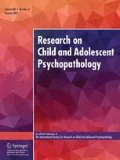Abstract
The social interactions of depressed and nondepressed mothers and their preschool-age children were observed and mothers' perceptions of child behavior assessed. Depressed mothers, as a group, exhibited more negative behavior than controls; however, no differences were found for maternal positive behavior or contingent responding. There was a high degree of reciprocity between child and mother behavior in both groups and there was a trend for children of the depressed mothers to be more negative than the control children. The results with cognitive measures were consistent with depressive realism in perception of social interactions: Depressed mothers recalled more negative child behavior than nondepressed mothers; however, these perceptions paralleled the observed interactions. Overall, the results suggest that maternal depression is associated with negative parent-child interactions and more negative, albeit fairly accurate, perceptions of child behavior.
Similar content being viewed by others
References
Beck, A. T. (1967).Depression: Causes and treatment. Philadelphia: University of Pennsylvania Press.
Beck, A. T., Ward, C. H., Mendelson, M., Mock, J., & Erbaugh, J. (1961). An inventory for measuring depression.Archives of General Psychiatry, 4, 561–569.
Biglan, A., Hops, H., Sherman, L., Friedman, L., Arthur, J., & Osteen, V. (1985). Problem solving interactions of depressed women and their husbands.Behavior Therapy, 16, 431–451.
Blumberg, S. R., & Hokanson, J. E. (1983). The effects of another person's response style on interpersonal behavior in depression.Journal of Abnormal Psychology, 49, 641–647.
Breznitz, Z., & Sherman, J. (1987). Speech patterning of natural discourse of well and depressed mothers and their young children.Child Development, 58, 395–400.
Brody, G. H., & Forehand, R. (1986). Maternal perception of child maladjustment as a function of the combined influence of child behavior and maternal depression.Journal of Consulting and Clinical Psychology, 54, 237–240.
Bugental, D. B., & Shennum, W. A. (1984). “Difficult” children as elicitors and targets of adult communication patterns: An attributional-behavioral transactional analysis.Monographs of the Society for Research in Child Development, 49 (1, Serial No. 205).
Cox, A. D., Puckering, C., Pound, A., & Mills, M. (1987). The impact of maternal depression in young children.Journal of Child Psychology and Psychiatry, 28, 917–928.
Downey, G., & Coyne, J. C. (1990). Children of depressed parents: An integrative review.Psychological Bulletin, 108, 50–76.
Endicott, J., & Spitzer, R. L. (1978). A diagnostic interview: The Schedule for Affective Disorders and Schizophrenia.Archives of General Psychiatry, 35, 837–844.
Field, T., Healy, B., Goldstein, S., & Guthertz, M. (1990). Behavior-state matching and synchrony in mother-infant interactions of nondepressed and depressed dyads.Developmental Psychology, 26, 7–14.
Gordon, D., Burge, D., Hammen, C., Adrian, C., Jaenicke, C., & Hirota, D. (1989). Observations of interactions of depressed women with their children.American Journal of Psychiatry, 146, 50–55.
Griest, D., Wells, K. C., & Forehand, R. (1979). An examination of predictors of maternal perceptions of maladjustment in clinic-referred children.Journal of Abnormal Psychology, 88, 277–281.
Hartmann, D. P. (1977). Considerations in the choice of interobserver reliability estimates.Journal of Applied Behavior Analysis, 10, 103–116.
Hoffman, D. A., Fagot, B. I., Reid, J. B., & Patterson, G. F. (1987). Parents rate the Family Interaction Coding System: Comparisons of problem and nonproblem boys using parentderived behavior composites.Behavioral Assessment, 9, 131–140.
Hokanson, J. E., Sacco, W. P., Blumberg, S. R., & Landrum, G. C. (1980). Interpersonal behavior in a mixed motive game.Journal of Abnormal Psychology, 89, 320–332.
Hops, H., Biglan, A., Sherman, L., Arthur, J., Friedman, L. S., & Osteen, V. (1987). Home observations of family interactions of depressed women.Journal of Consulting and Clinical Psychology, 55, 341–346.
Knutson, J. F. (1983).Home observation code system. Unpublished manuscript, University of Iowa.
Lovejoy, M. C. (1984). [Maternal ratings of the Home Observation Code]. Unpublished raw data.
Mehm, J. M. (1982).An empirical comparison of strategies for data analysis and assessment of observer agreement using a time-based behavioral observation coding system. Unpublished Master's thesis. University of Iowa.
Mehm, J. G., & Knutson, J. F. (1987). A comparison of event and interval strategies for observational data analysis and assessments of observer agreement.Behavioral Assessment, 9, 151–167.
Rehm, L. P. (1977). A self-control model of depression.Behavior Therapy, 8, 787–804.
Richters, J., & Pellegrini, D. (1989). Depressed mothers' judgments about their children: An examination of the depression-distortion hypothesis.Child Development, 60, 1068–1075.
Rickard, K. M., Forehand, R., Wells, K. C., Griest, D. L., & McMahon, R. J. (1981). Factors in referral of children for behavioral treatment: A comparison of mothers of clinicreferred deviant, clinic-referred nondeviant, and non-clinic children.Behaviour Research and Therapy, 19, 201–205.
Spitzer, R. L., Endicott, J., & Robins, E. (1978). Research diagnostic criteria: Rationale and reliability.Archives of General Psychiatry, 36, 773–782.
Winer, B. J. (1971).Statistical principles in experimental design (2nd ed.). New York: McGraw Hill.
Zussman, J. U. (1980). Situational determinants of parental behavior: Effects of competing cognitive activity.Child Development, 51, 792–800.
Author information
Authors and Affiliations
Additional information
This study is based on portions of a doctoral dissertation completed in the Department of Psychology at the University of Iowa. I appreciate the guidance of my advisors Michael O'Hara and Donald K. Routh and committee members Leonard Feldt, John Knutson, and Sue Rosner.
Rights and permissions
About this article
Cite this article
Lovejoy, M.C. Maternal depression: Effects on social cognition and behavior in parent-child interactions. J Abnorm Child Psychol 19, 693–706 (1991). https://doi.org/10.1007/BF00918907
Revised:
Issue Date:
DOI: https://doi.org/10.1007/BF00918907




